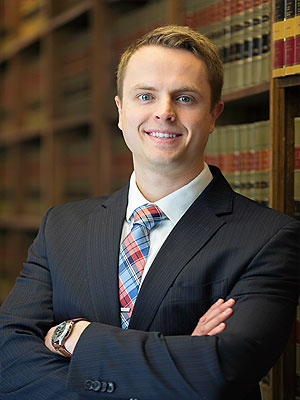 The importance of having well-drafted written contracts cannot be understated in the business context. No matter the relationship of the parties to the underlying agreement, having that agreement documented in writing is the safest way to memorialize the parties’ contract. Although not recommended, a verbal contract is not invalid per se. With certain exceptions, parties are free to create verbal agreements that are legally binding.
The importance of having well-drafted written contracts cannot be understated in the business context. No matter the relationship of the parties to the underlying agreement, having that agreement documented in writing is the safest way to memorialize the parties’ contract. Although not recommended, a verbal contract is not invalid per se. With certain exceptions, parties are free to create verbal agreements that are legally binding.
Statute of Frauds
The statute of frauds provides that some agreements must be in writing for a party to maintain a lawsuit on the basis of the parties’ agreement. The statute of frauds carves out exceptions to the general rule that a verbal contract or oral promise is enforceable. Minnesota Statute, Section 513.01(2) provides that a party may not sue another for a “special promise to answer for the debt, default or doings of another” unless that agreement is in writing and signed by the defending party. In simpler terms, Party A (plaintiff / creditor) may not sue Party B (defendant / personal guarantor) for Party B’s oral promise to guarantee the debt of Party C (original debtor / party in default). A hypothetical illustration will be presented below to better explain the applicability of this portion of the statute of frauds.
Hypothetical
Picture yourself as a small business owner in Minnesota in the mid-2000s. Your hypothetical company, MN Renovation Pros, LLC, has had improving business and several steady years of profits. MN Renovation Pros, LLC has multiple new potential projects lined up but it will need additional capital to support upfront costs associated with those business opportunities. MN Renovation Pros, LLC engages a lender (Bank, N.A.) for funds and Bank, N.A. agrees to lend your business $25,000. As the sole owner of MN Renovation Pros, LLC, you make an oral promise to guarantee the debt of MN Renovation Pros, LLC. There was no written contract signed by MN Renovation Pros, LLC and Bank, N.A. Further, your personal guarantee was not in writing.
Unfortunately for your business, and the nationwide economy at the end of the 2000s, MN Renovation Pros, LLC fell victim to the recession and shut its doors without repaying Bank, N.A. Bank, N.A. eventually brings a lawsuit against MN Renovation Pros, LLC for breach of contract on the oral agreement to repay the $25,000. You are also named individually in the lawsuit as a personal guarantor on the debt. Because the business folded and had no tangible assets that Bank, N.A. could pursue, one of its goals in suing you is to obtain a judgment against you so that it may try to garnish your assets.
This scenario is not limited to business transactions. The original debtor could be family member or friend for which you verbally agree to guarantee their debt. Likewise, the lender could also be a friend, co-worker, or any other party willing to lend money. As discussed below, although the relationships of the parties to the agreement is relevant, it is not wholly determinative of the validity of the oral promise to answer for the debt of another.
An Exception to the Exception – When an Oral Promise to Answer for the Debt of Another May be Enforced.
As noted above, the statute of frauds found in Minn. Stat. § 513.01(2) generally bars claims against a party guaranteeing (answering for) the debt of another unless that agreement is in writing. Upon first read of the statute, Bank, N.A. may appear to be out of luck and the individual oral guarantor may be hoping the case against them will be barred. However, there is an exception to the exception.
The statute of frauds will not bar enforcement of an oral agreement “when the promisor has an interest in the performance of a contract and the guarantee is not made to merely accommodate the debtor.” Marvin Lumber & Cedar Co. v. Johnson, 733 F. Supp. 1302, 1304 (D. Minn. 1990) (emphasis added); See also Burkel v. Pro–Vid–All Mills, Inc., 273 Minn. 297, 141 N.W.2d 143, 146 (1966); Esselman v. Production Credit Ass’n., 380 N.W.2d 183, 187 (Minn. Ct. App. 1986).
Minnesota courts differentiate between “collateral promises,” which fall within the statute of frauds and require a writing, and “original promises,” which fall outside the scope of the statute of frauds. Allison v. Best Recycling & Disposal, Inc., 565 N.W.2d 437, 438 (Minn. Ct. App. 1997). Generally, a signed writing is required to enforce a personal guarantee when the promise is “collateral,” but not when the promise is “original.” See Esselman v. Prod. Credit Ass’n, 380 N.W.2d 183, 187 (Minn. Ct. App. 1986). A collateral promise is one that “provides no (direct) benefit to the promisor.” Best Recycling, 565 N.W.2d at 438. Alternatively, an original promise is “one where the leading object of the promisor is to subserve or promote some interest or purpose of [its] own, as opposed to becoming merely the surety or guarantor of another’s debt.” Id. (quoting J.J. Brooksbank Co. v. American Motors Corp., 289 Minn. 404, 409, 184 N.W.2d 796, 799 (1971)). The promisor to an original promise must directly or primarily benefit from the promise. Id.
In determining whether an oral promise was “original,” and not barred by the statute of frauds, or “collateral,” Minnesota courts may take into account a myriad of factors in analyzing the oral promise:
- Was the promisor the founder of the business?
- Is the promisor the sole shareholder in the debtor-business?
- Is the promisor also a director and/or officer?
- Did the promisor provide financial support to establish (and possibly maintain) the debtor-business?
- Was the promisor the primary negotiator with banks and other creditors on behalf of the debtor-business?
The courts have not established a clear-cut objective analysis for determining whether an oral promise to guarantee the debt of another may be enforceable as falling outside the statute of frauds. Given the facts stated above involving MN Renovation Pros, LLC, it is possible that two different trial courts could arrive at two separate outcomes; one finding the individual liable and the other finding that the oral promise is not enforceable due to the statute of frauds. These types of cases are very fact specific and often involve lengthy discovery and motion practice.
The cost to litigate or defend a matter such as the one presented above would likely be expensive for the creditor and individual debtor. Even though hindsight is 20/20, both parties would have been better off had they signed a written contract containing a personal guarantee. The creditor’s suit would have a greater likelihood of success and the individual debtor would not have to pay to defend a suit involving issues not likely to be ruled on by the court early on in a lawsuit due to the factual issues abound. If one party or both parties in this scenario had counsel from the outset, the end result could have been more predictable and less costly.
This post was created by Christopher Boline, a commercial and business litigator at Dudley and Smith, P.A. Mr. Boline has litigated cases in Minnesota involving the verbal personal guarantees and the statute of frauds. If you have questions about contract drafting, personal guarantees, promissory notes, or other issues involving commercial and business litigation, please contact Mr. Boline at 651-291-1717 or by email at cboline@dudleyandsmith.com. Dudley and Smith, P.A. is a full service law firm with offices in St. Paul, Bloomington, Burnsville, Chanhassen, White Bear Lake, and Woodbury.
The law is continually evolving and Dudley and Smith, P.A.’s blog posts should not be relied upon as legal advice, nor construed as a form of attorney-client relationship. Postings are for informational purposes and are not solicitations, legal advice, or tax advice. A viewer of Dudley and Smith, P.A.’s blog should not rely upon any information in the blog without seeking legal counsel.

